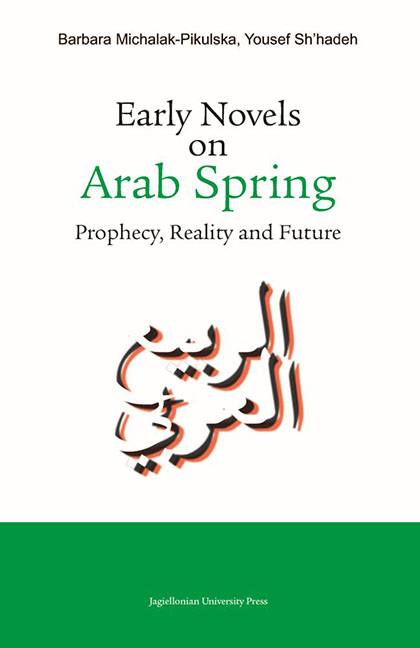Book contents
- Frontmatter
- Contents
- Introduction
- Part I Awakening of the Awareness of Subjugation – The Prophecy of the Spring of Nations in Arab Novels
- Part II At the Heart of the Arab Spring Events
- Part III The Future: The Spring Continues
- 17 Mu‘Taṣim Aš - Šā‘Ir : Uhzūǧat ar-raḥīl (A Song of Departure) and Fī intiẓār as-sulaḥfāt (Waiting for a Turtle)
- 18 Aḥmad ‘Abd Al - Malik : Al-Aqni‘a (Masks)
- 19 Ṭayba Aš - Šarīf Al - Idrīsī : Ḥaǧar min saqar (A Stone from Hell)
- 20 Amīra Aš - Širbīnī : ‘Itq (Liberation)
- 21 ‘ Izz Ad - Dīn Šukrī Fašīr : Bāb al-ẖurūǧ – risālat ‘Alī al-muf‘ama bi-bahǧa ġayr mutawaqqa‘a (The Gate to Leave – Ali’s Letter Filled with Unexpected Joy)
- Conclusion
- Bibliography
- Summary in Arabic
4 - ‘Adnān Farzāt : Ra’s ar-raǧul al-kabīr (The Head of the Great Man)
Published online by Cambridge University Press: 13 October 2023
- Frontmatter
- Contents
- Introduction
- Part I Awakening of the Awareness of Subjugation – The Prophecy of the Spring of Nations in Arab Novels
- Part II At the Heart of the Arab Spring Events
- Part III The Future: The Spring Continues
- 17 Mu‘Taṣim Aš - Šā‘Ir : Uhzūǧat ar-raḥīl (A Song of Departure) and Fī intiẓār as-sulaḥfāt (Waiting for a Turtle)
- 18 Aḥmad ‘Abd Al - Malik : Al-Aqni‘a (Masks)
- 19 Ṭayba Aš - Šarīf Al - Idrīsī : Ḥaǧar min saqar (A Stone from Hell)
- 20 Amīra Aš - Širbīnī : ‘Itq (Liberation)
- 21 ‘ Izz Ad - Dīn Šukrī Fašīr : Bāb al-ẖurūǧ – risālat ‘Alī al-muf‘ama bi-bahǧa ġayr mutawaqqa‘a (The Gate to Leave – Ali’s Letter Filled with Unexpected Joy)
- Conclusion
- Bibliography
- Summary in Arabic
Summary
Changes are inscribed in the world order and human life. Each of us needs them. Over time, we gain a new attitude to reality. We try to gather as much experience as possible. This is also true in the case of the hero of the novel Ra’s ar-raǧul al-kabīr (The Head of the Great Man), who experiences internal and spiritual transformation.
The novel describes the Syrian reality, full of corruption, and is a kind of prophecy of upcoming changes. People are expressing their dissatisfaction openly and firmly. The main character is Ṣuhayb, who made a fortune by trading copies of valuable ancient sculptures. He began this practice when one of the traders of monuments asked him to find the head missing from the torso of an Aramaic king that was unearthed by archaeologists. After painstaking and difficult excavations, the missing part of the sculpture is found. The hero, however, does not give the trader the original, only the counterfeit he creates, because he is a talented sculptor and painter. The original is kept and hidden in a safe place. Although Ṣuhayb becomes one of the richest inhabitants of Aleppo, he is not happy. He is tormented by remorse over the methods he used to achieve his wealth. That is why he often returns to the modest room in which he lived as a student and still lives throughout the “poor people week.” During this time, he also hands out money and gifts to people living in a poor neighborhood nearby.
In the novel, the author focuses on corruption in a country where it allows quick enrichment in a dishonest way. He makes it clear that corruption is the direct cause of the revolution. The author predicts that demonstrations started in Syrian cities will also reach Aleppo, which is still a peaceful place. This city for a long time did not join the Syrian revolution. All this is contained in the last chapter of the novel, entitled “At-Talwīḥa al-aẖīra” (The Last Waving), where you can see that the revolution is approaching the rich districts of Aleppo.
- Type
- Chapter
- Information
- Early Novels on Arab SpringProphecy, Reality and Future, pp. 19 - 21Publisher: Jagiellonian University PressPrint publication year: 2022

